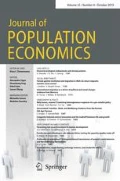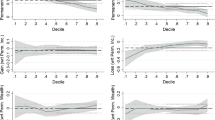Abstract.
The observed practice of discounting the future should not be rationalised on the grounds of myopia or selfishness. A positive rate of pure time preference is necessary to ensure that heterogeneous generations are treated in an egalitarian fashion. A zero social discount rate would yield intertemporal allocations which are biased against the current generations. Endogenous productivity growth requires that the social discount rate be set above the subjective rate of pure time preference. Positive social time preference, far from discriminating against future generations, is essential for a fairer intertemporal allocation of resources.
Similar content being viewed by others
Author information
Authors and Affiliations
Additional information
Received: 3 July 1999/Accepted: 6 October 1999
Rights and permissions
About this article
Cite this article
Marini, G., Scaramozzino, P. Social time preference. J Popul Econ 13, 639–645 (2000). https://doi.org/10.1007/s001480050155
Issue Date:
DOI: https://doi.org/10.1007/s001480050155




